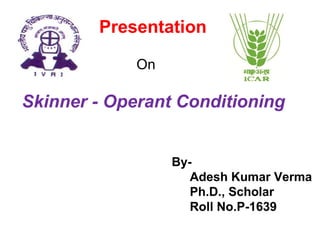
Skinner operant conditioning
- 1. Skinner - Operant Conditioning Presentation On By- Adesh Kumar Verma Ph.D., Scholar Roll No.P-1639
- 2. Outline of Presentation Introduction Genesis of operant conditioning Concept of operant conditioning Types of operant Schedules of Reinforcement Shaping How operant conditioning differs from Classical conditioning? Summary
- 3. Introduction Behaviorism Conditioning Types of conditioning Classical conditioning Operant conditioning B. F. Skinner ?
- 4. Genesis of operant conditioning Thorndike Learning in animals Puzzle box Propose the theory known as the 'Law of Effect‘. Law of Effect – Reinforcement
- 5. Concept of operant conditioning Given by- B.F. Skinner Coined term operant conditioning Means :- changing of behavior by the use of reinforcement (which is given after the desired response) and punishment (which is given after the undesired response)
- 6. Types of operant Skinner identified three types of responses or operant that can follow behavior Neutral operants: responses from the environment that neither increase nor decrease the probability of a behavior being repeated. Reinforcers: Responses from the environment that increase the probability of a behavior being repeated. Reinforcers can be either positive or negative. Punishers: Response from the environment that decrease the likelihood of a behavior being repeated. Punishment weakens behavior.
- 9. Graphical view of Behaviour by- using cumulative recorder
- 10. Schedules of Reinforcement 1. Continuous Reinforcement 2. Partial Reinforcement Fixed-ratio schedules Variable-ratio schedules Fixed-interval schedules Variable-interval schedules . Choosing a Schedule
- 11. Shaping Shaping is an experimental process used in operant conditioning by which successive approximations of a target behavior are reinforced. B.F. Skinner used shaping, a method of training by which successive approximations toward a desired target behavior are reinforced, to test his theories of behavioral psychology. The shaping method relies on the use of behavioral reinforcement and punishment, which lead subjects toward a desired behavior, and discourage them from displaying undesired behaviors. Skinner’s early experiments in operant conditioning involved the shaping of rats to learn to how press a lever to receive a food reward.
- 12. How operant conditioning differs from Classical conditioning? Developmental differences
- 13. Functional difference Classical conditioning Operant conditioning Nature of response Timing of Stimulus Timing of Response Role of learner Voluntary (usually) but can be both – Vol & Involuntary After the desired response ActivePassive Precedes the response Involuntary (reflexive) After the stimulus Before the stimulus
- 14. Operant Conditioning Summary Psychology should be seen as a science, to be studied in a scientific manner. Deals with observable behavior. The major influence on human behavior is learning from our environment. Skinner proposed that the way humans learn behavior is much the same as the way the rats learned to press a lever. There is little difference between the learning that takes place in humans and that in other animals.
